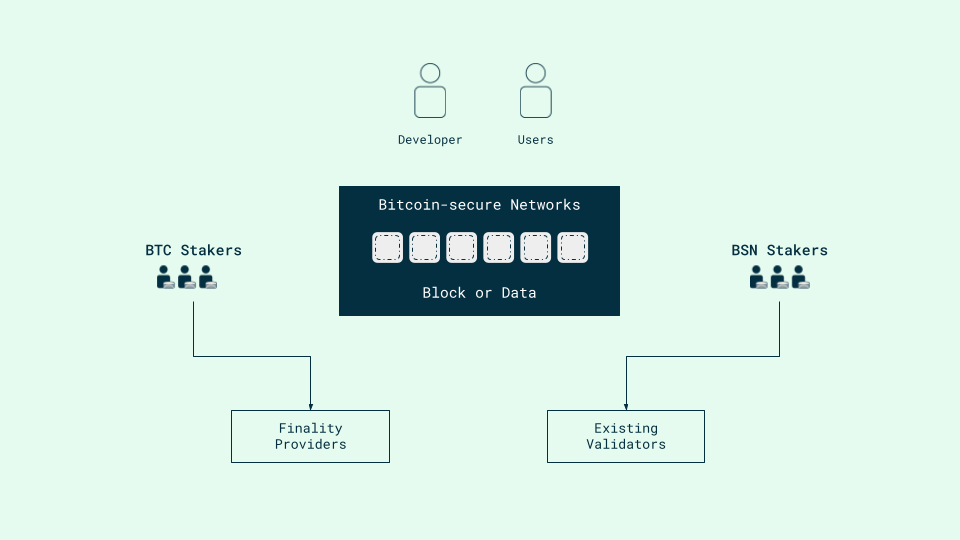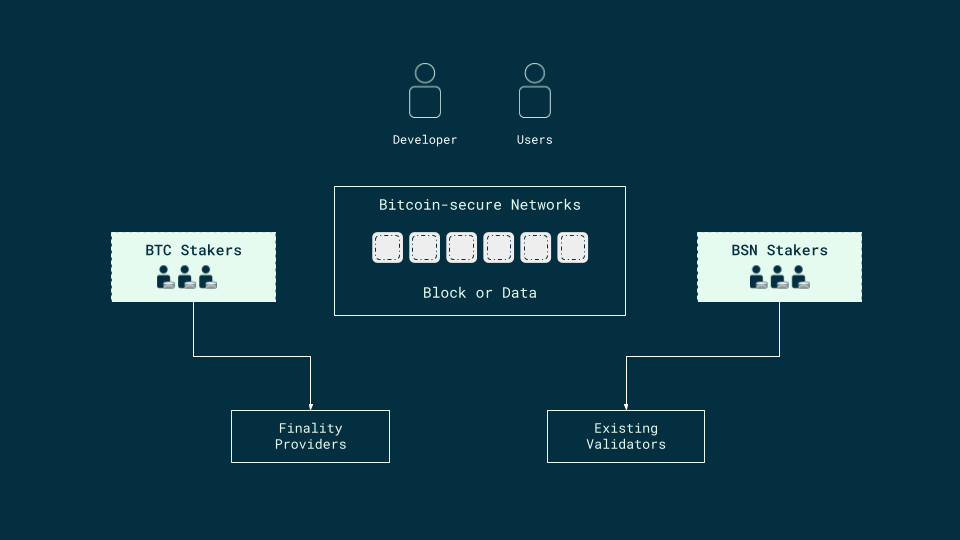What is a BSN?
Bitcoin Supercharged Networks (BSNs) are blockchain networks that leverage Bitcoin's security and liquidity through Babylon's native Bitcoin staking protocol. In addition to traditional Proof-of-Stake security mechanisms, BSNs ensure its blocks are final and unchangeable using Bitcoin as stake.
BSNs utilize multi-staking architecture that enables secure Bitcoin staking across multiple networks simultaneously. The technical foundation centers on three key aspects:
Extractable One-Time Signatures (EOTS) form the cryptographic backbone of BSNs. Built on Bitcoin's native Schnorr signature algorithm, EOTS enables slashing through cryptographic key extraction. When finality providers generate EOTS key pairs for each block height, any double-signing at the same height exposes their private key, enabling automatic slashing enforcement without requiring social consensus.
Bitcoin Staking Contracts operate directly on Bitcoin's blockchain using native UTXO scripting. These contracts have two spending conditions: a timelock condition allowing stakers to withdraw after a specified period, and a slashing condition that enables a covenant committee to burn staked Bitcoin if protocol violations are detected. This design maintains self-custody while ensuring cryptographic security guarantees.
Babylon Genesis serves as the control plane and first BSN implementation, orchestrating security and liquidity across the entire ecosystem. Built on Cosmos SDK with CosmWasm support, it provides the coordination layer for Bitcoin staking rewards distribution and cross-chain communication via IBC (Inter-Blockchain Communication) protocol.


BSN Integration Explained
BSNs emerge from Babylon Labs' three-phase development strategy. Phase 1 established native Bitcoin staking on Bitcoin mainnet. Phase 2 launched Babylon Genesis as the first BSN and control plane, implementing a dual security model combining Bitcoin staking with BABY token validation. Phase 3 enables the broader ecosystem expansion where L1s and L2s integrate the Babylon Bitcoin staking protocol.
The integration framework supports multiple blockchain architectures including Cosmos SDK chains through native IBC protocol support, OP Stack compatibility for Optimistic rollups, Arbitrum Stack integration for Layer 2 solutions.
BSNs gain access to Bitcoin's security through finality providers - delegated validators that sign blocks using EOTS signatures. When more than 2/3 of the Bitcoin stake signs a block, it achieves finality with Bitcoin-level security guarantees. This process happens independently of the base consensus mechanism, making BSNs compatible with any existing Proof-of-Stake implementation.
Key Benefits of BSN Architecture
BSNs offer developers several compelling advantages over traditional blockchain networks:
- Bitcoin-level security provides unprecedented protection backed by 15+ years of proven network security and the world's largest cryptocurrency market capitalization
- Fast finality combines Proof-of-Stake efficiency with Bitcoin security, enabling quick transaction confirmation while maintaining robust security guarantees
- Trustless operation eliminates the need for wrapped tokens, bridges, or custodial solutions
- Capital efficiency allows a single Bitcoin stake to secure multiple networks simultaneously
- Modular integration enables BSNs to work with any Proof-of-Stake consensus mechanism without requiring changes to existing blockchain architectures
- Liquid staking tokens (LSTs) provide liquidity while maintaining staking benefits, enabling DeFi participation and yield optimization strategies
Differences from Traditional Blockchains
Traditional blockchain networks face the cold-start problem where new networks struggle to attract sufficient validators and stake to ensure security. BSNs solve this by providing immediate access to Bitcoin's established security model.
Security Model
While traditional networks depend on their native token's value and validator set size, BSNs inherit Bitcoin's proven security backed by the world's most secure blockchain. This provides stronger guarantees against attacks and reduces the risk of security failures during network growth phases.
Liquidity Access
Traditional networks are limited to their native token holders and ecosystem participants, while BSNs can tap into Bitcoin's massive liquidity pool. This enables deeper markets, more stable economics, and broader participation from Bitcoin holders who previously couldn't participate in staking.
Decentralization
BSNs benefit from Bitcoin's globally distributed mining network and established validator ecosystem. Rather than building validator networks from scratch, BSNs leverage Bitcoin's existing decentralization, providing stronger censorship resistance and geographic distribution.
Unique Features
-
Better economic security: Native BTC staked to protect the rollup and improve its economic security, especially important for new OP-stack chains with fewer adoption. The staked BTC achieves slashable safety, where equivocations by L2 sequencers are held accountable and the BTC stake is slashable, even when equivocating L2 sequencers constitute a majority.
-
Fast finality: Improved economic security benefits OP stack chains for fast finality. If users trust votes backed by BTC stake, they can confirm transactions without waiting for the lengthy challenging period in optimistic rollups.
-
Reorg resilience of L2 transactions: Once a transaction is included in an L2 block signed by the majority of BTC-backed Finality Providers, the sequencer cannot publish a different L2 block at the same height on L1.
Bitcoin Staking Security Model for BSNs
The security model combines Bitcoin's proven Proof-of-Work foundation with efficient Proof-of-Stake consensus:
- Slashing mechanisms ensure that any safety violations by finality providers result in automatic penalties through the EOTS signature system
- Timestamping security anchors BSN events to Bitcoin's blockchain, providing immutable checkpoints that prevent long-range attacks
- Economic security scales with Bitcoin's market capitalization, providing substantial economic barriers to attacks
- Isolation boundaries prevent security issues in one BSN from affecting others
- Chain-specific parameters allow customization of slashing conditions and security requirements
BSN Integration Support
Babylon provides everything a BSN needs to integrate quickly, from ready-made modules to hands-on development and business support.
Developer Tools
- Babylon SDK – Reference Cosmos SDK modules for BSN integration
- babylond CLI – Command-line tools for node operations and network interaction
- EOTS Manager – Secure cryptographic key management
- Finality Provider Daemon (fpd) – Validator operations and block signing
- Testing & Deployment – Edge Devnet, Bitcoin Signet testnet, token faucets, and Docker-based local environments
Reference Implementation
- Existing Standards – Integration follows established Cosmos SDK, CosmWasm, and Bitcoin staking standards
- Ready-to-Use Contracts – Deploy
babylon_contract.wasm,btc_staking.wasm, andbtc_finality.wasm - Bridge Module –
x/babylonconnects Cosmos SDK and CosmWasm contracts - IBC Support – Preconfigured for Babylon network communication
With these tools and reference modules, BSNs avoid building from scratch and can focus on network features instead of foundational infrastructure.
Development & BD Support
Our team provides:
- Technical guidance for integration and testing
- Business development support to connect BSNs with partners, stakers, and ecosystem programs
Contact our BD team to discuss BSN integration.
Integration Guides
Cosmos Chain Integration Guide
OP-stack L2 Chain Integration Guide